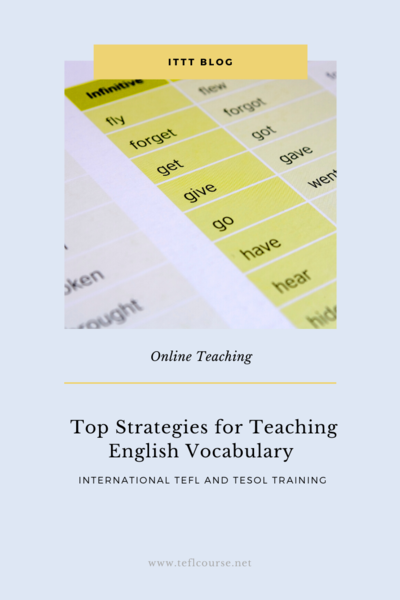Top Strategies for Teaching English Vocabulary

While learning the second language, we all want to speak fluently as much as we can. What do we need to speak fluently; grammar, vocabulary, structure or other knowledge of language? Let's think that we know all the grammar rules and structures. How can we speak without a lack of knowledge of vocabulary? The most difficult part of learning a second language is to learn vocabulary because words are easy to forget and are confusable. As a teacher, our role in teaching vocabulary is vital. Teaching vocabulary is the most important part of teaching the second language so we need to use a mix of teaching methods and techniques. In this article, we see how we can use some of the methodologies and techniques efficiently to teach vocabulary.
Table of Contents
Do you want to teach English abroad? Take a TEFL course!
This post was written by our TEFL certification graduate BaÅŸar A. Please note that this blog post might not necessarily represent the beliefs or opinions of ITTT.
Word Meaning
It is impossible to know the whole words in English. So, how can we manage this problem? While teaching vocabulary, we also have to teach how to guess the meaning of a word. We will face difficulties during this period. But we need to find the best way. First of all, we must analyze our students' learning styles and choose our techniques and methods. These methods must be selected and mixed according to students who are bodily-kinesthetic, visual, verbal, inter or intrapersonal, musical.
Also Read: 5 Things You Can Overcome If You Prepare Your Lesson Plan
Engagement Stage
In vocabulary teaching, the pre-teaching part is vital. Let's say we will teach the word "queen". We can not just say "the wife of the king" and move on to the lesson. The teacher must bring the student's previous and related knowledge of the target vocabulary to their mind. We can show a castle, a crown, a royal family or some other pictures related to the queen. This helps visual students. Another way of pre-teaching is story-telling. The teacher can create a story about a queen and can give target vocabulary and help students guess the meaning of them. This helps verbal students. The teacher can make students listen to music about a queen or make them watch a part of the musical, or can create a little drama. Which way is the best? The answer is, of course, mixing these techniques. The activities must cover all bases of learning styles.

Also Read: How long are TEFL contracts?
Study Stage Ideas
Most of the vocabulary teaching happens with a reading comprehension passage. The following paragraph is about friendship. "Friendship is a faithful and loyal relationship between two or more people living anywhere in the world. We cannot leave our whole life alone and need a faithful relationship with someone to live happily called friends. Friends have an intimate relationship and ca trust to each other forever. It is not limited to the age, sex and position of the person mean friendship can be between men and women, men and men, women and women or human to animals of any age group". Let's create an activity to teach vocabulary mixing all learning styles for this paragraph. The bold words are our target vocabulary. This is easier than teaching vocabulary without a context. In this example, we have a text and we have connected words, phrases, and sentences to those target words. SO we have a good context. There is a general meaning. Now, it is time to make connections real-life examples of these bold words to students' life. While doing so, we must use visual aids to support our definitions. We can create a story with target vocabulary or ask student questions which must ring a bell of previous knowledge of students. We can act to make students guess the meaning of vocabulary or we can use known songs to explain them.
Also Read: Ultimate Country Match Guide for Teaching EFL in the Middle East
No Context Cases
What happens if we don't have a context? We will teach occupations. How can we start our lesson? We can put photos of a person who does the jobs. Then we can ask students to explain their favorite occupation. Then we can read a story which is created by the teacher. There must be target words of occupations. Then you will tell a story like this; "You were on a plane. While you were crossing the sea, your plane crashed into the sea. 8 people reached to the near the island with you and on this island, there is only one boat and this boat can carry only 5 people. You will bring 4 people with you. Who will you choose?" Then you will give a card to them. On this card, some people write their jobs and personalities. You can group students and ask them to choose people. This game is really fun and children love playing. So you can use activities and games.

Also Read: The Importance of Lesson Planning for ESL Teaching
Activate Stage
In the while-teaching part, you must be sure that all target words are understood by students and can be used correctly. In this process, you need to have various short activities. But please be sure that you won't get students distracted. In the post-teaching part, your activities must be creative. Your students must create something on their own and it must be connected to their real life. Real-life examples will mostly be permanent. Connection to the real world is vital in this step.
Do you want to teach English abroad? Take a TEFL course!
As we can understand from the above, vocabulary teaching must be efficient because good vocabulary knowledge can build a strong base for language acquisition. We need a vocabulary to talk, to communicate, to express ourselves. Vocabulary is an artery for speaking, listening, writing, and reading. To understand what is spoken is said, and is written, people need vocabulary knowledge. As a teacher, if we can play our role well in teaching vocabulary, our student's acquisition will be permanent.
Apply now & get certified to teach english abroad!
Speak with an ITTT advisor today to put together your personal plan for teaching English abroad.
Send us an email or call us toll-free at 1-800-490-0531 to speak with an ITTT advisor today.
Related Articles:
- Top 10 Qualities Every Great Teacher Should Have
- 7 Awesome Ideas for Business English Classes
- The 10 Most Common Types of EFL Teaching Jobs
- What It's Like To Teach English Online: An Online Teacher Reveals Her Secrets!
- How To Write The Perfect ESL Lesson Plan
- Getting Student Placement Right - The Best Desk Arrangements for EFL Students




